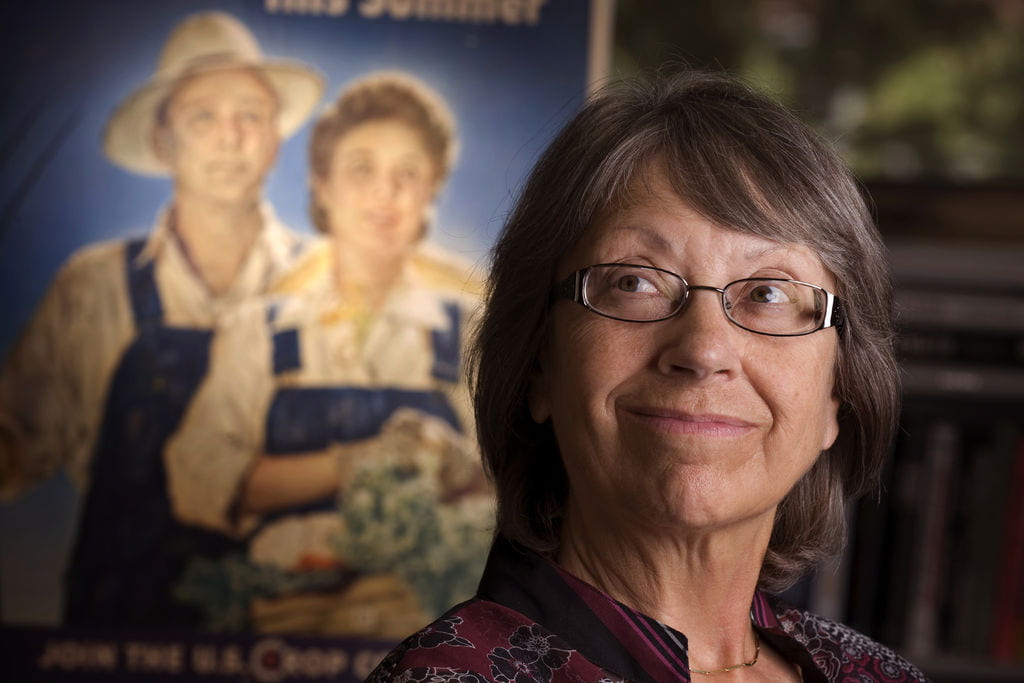Touching the past
Professor of the Year Emily Rosenberg has a hands-on approach to teaching 20th century U.S. history.

On the first day of her undergraduate U.S. survey course, UC Irvine history professor Emily Rosenberg likes to show the class a 1900 Sears, Roebuck and Co. catalog. With its old-time illustrations of everything from barber chairs to sewing machines, the “book of bargains” is a quaint antique in the hands of students who can shop online without leaving their desks.
“I use it to help them imagine the isolation of farm families and think about how mass-produced and marketed goods changed American life. Back then, the catalog opened up a magical world,” says Rosenberg, who often brings props — such as her grandfather’s World War II posters — to class to give students a better feel for the past. “There are ways to connect to students and make assignments meaningful, even when you teach a large lecture class.”
Her hands-on teaching methods earned her UCI’s Professor of the Year award at the Celebration of Teaching in May. In his nomination letter, Robert Moeller, UCI history chair and professor, noted: “In her first two years at UCI, she got teaching evaluations that were amazing. Her scores in upper-division classes were 6.59, 6.47 and 6.81 on a 7-point scale. Even in a department that prides itself on its teaching, these scores are quite remarkable.”
“We’ve received repeated comments about Emily’s enthusiasm and engagement,” Moeller continued. “One student said, ‘She opened my eyes to a different view of history that was more than a bunch of facts.'”
The self-effacing Rosenberg says her subject matter — 20th century history — gives her an advantage in the classroom. “It’s the age of the camera; moving pictures and photographs are all-important,” she says. “I can give students a broad visual tour of American people and culture. A flow of images in every lecture brings immediacy to the material.”
Each week, students in her U.S. history survey course are assigned to work with a different type of source material — ads, photos, artwork, newspapers and memoirs, campaign commercials, old educational and entertainment films, and oral interviews with their own families or friends.
“This shows them how historians use primary sources,” she says. “I believe students should ‘do’ history in order to learn it.”
Rosenberg taught at Macalester College in St. Paul, Minn., before joining UCI four years ago, primarily to teach graduate-level history.
“Emily came to UCI to have a second career as a graduate teacher, and in this arena she has truly soared,” Moeller wrote in his letter. “She’s both a great teacher and an advocate for graduate students, working to meet their needs through the department’s graduate program committee while supporting their professional growth as past president and member of the Society for Historians of American Foreign Relations.
“As one graduate student put it, ‘Professor Rosenberg is a wonderful mentor and an excellent example of the intellectual nurturing that needs to take place in any classroom.’ It would be difficult to overemphasize the difference she has made in our graduate program.”
An expert on America’s rise to superpower status in the 20th century, Rosenberg has introduced graduate courses that examine the U.S.’s place in the world. She’s particularly intrigued by the spread of American culture – how McDonald’s, Coca-Cola, New York Yankees ball caps, Hollywood blockbusters, etc. gain appeal in foreign countries.
“There was a long tradition of seeing the proliferation of U.S. products as cultural imperialism,” Rosenberg says. “But some scholars, including myself, have challenged that. We see our cultural expansion as evidence not of our ability to dominate people — although the U.S. does wield economic power — but of the malleability of American culture.
“The U.S. culture has a fluid character that morphs and becomes localized in a million different ways because it emerges out of a rich immigrant mix of people. Cultures worldwide have shaped a dynamic and changing America even as we have influenced the world.”
Rosenberg began studying U.S. international relations while a college student in the ’60s. “As the Vietnam War escalated, I became interested in America’s power and the exercise of it,” she says.
Asked why she went on to become a history professor, Rosenberg offers an answer her own students might appreciate: “I had compelling teachers.”